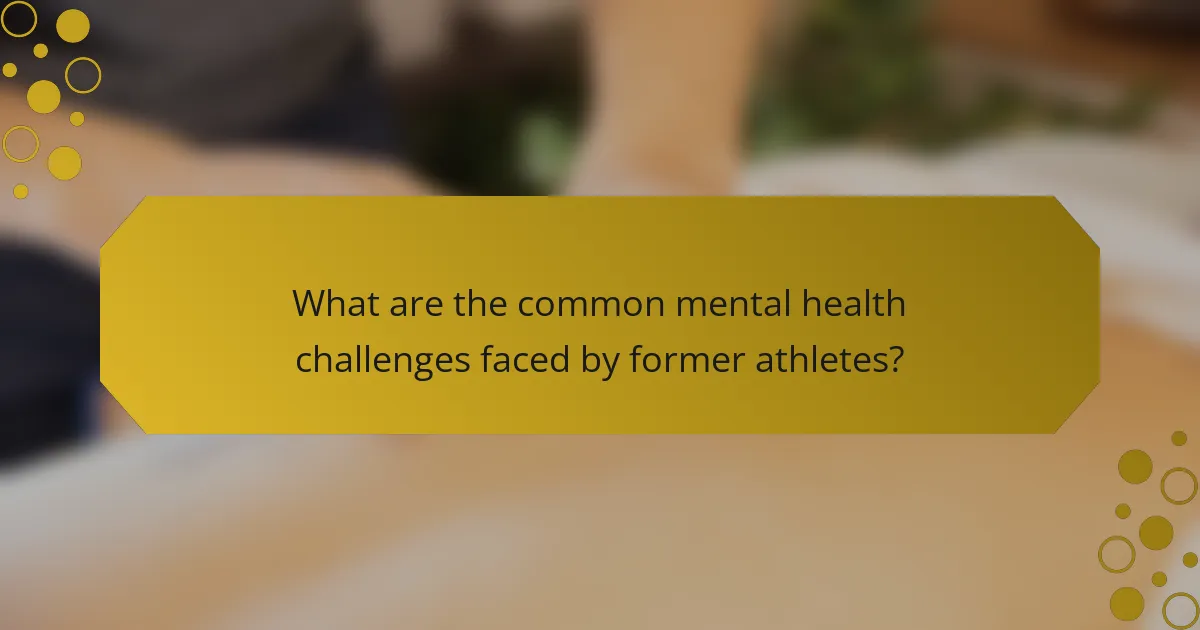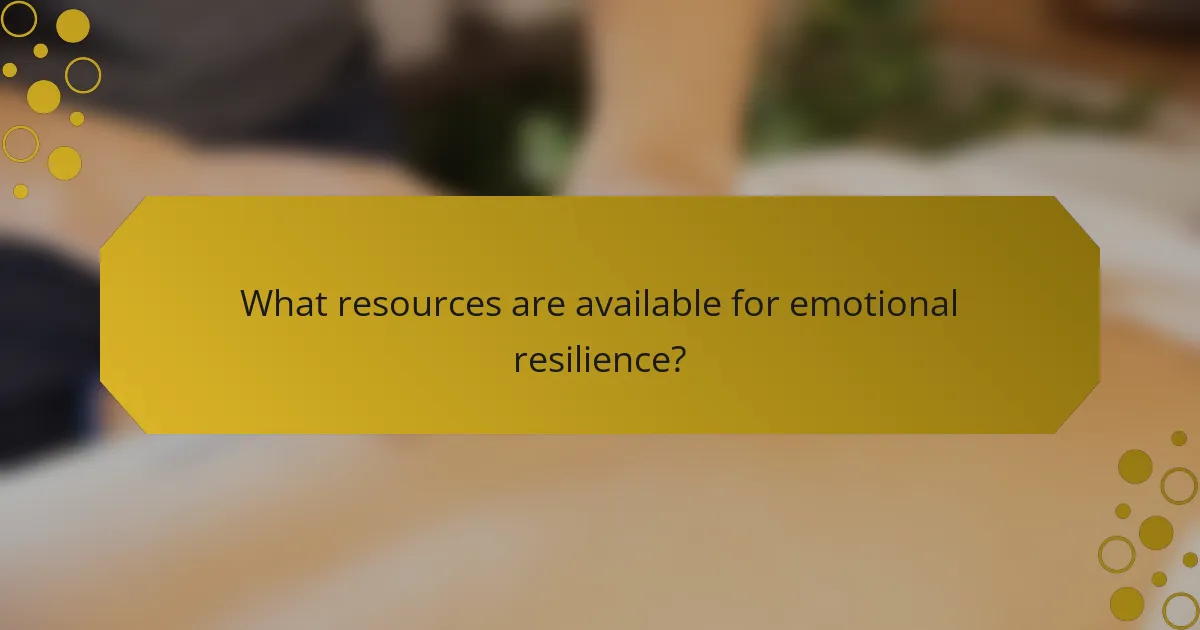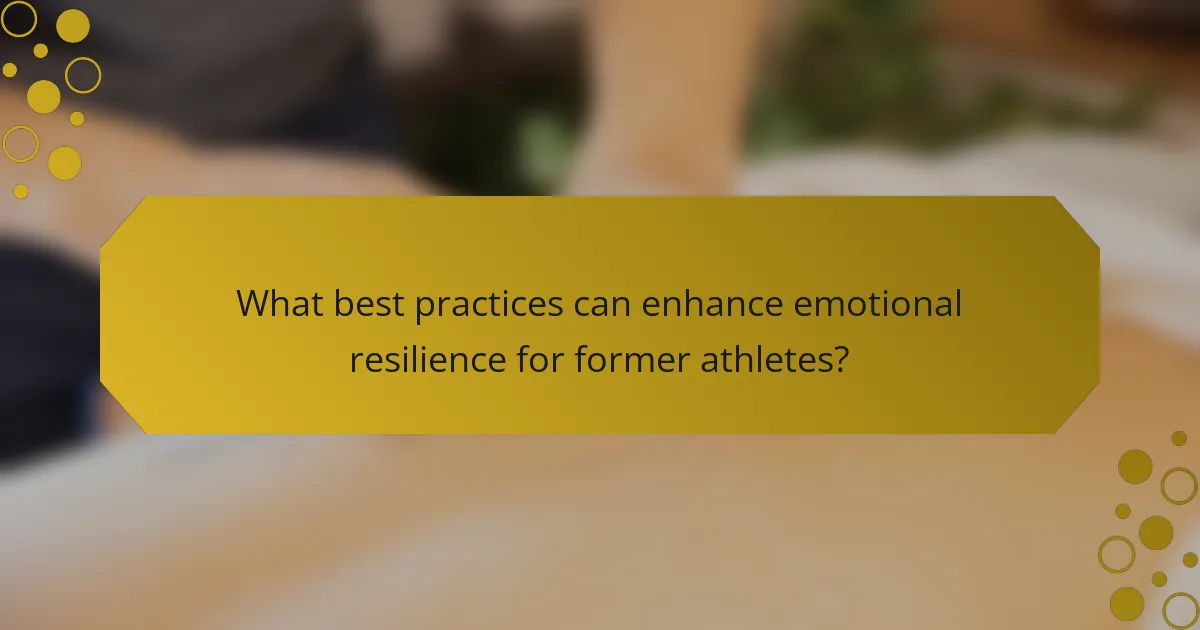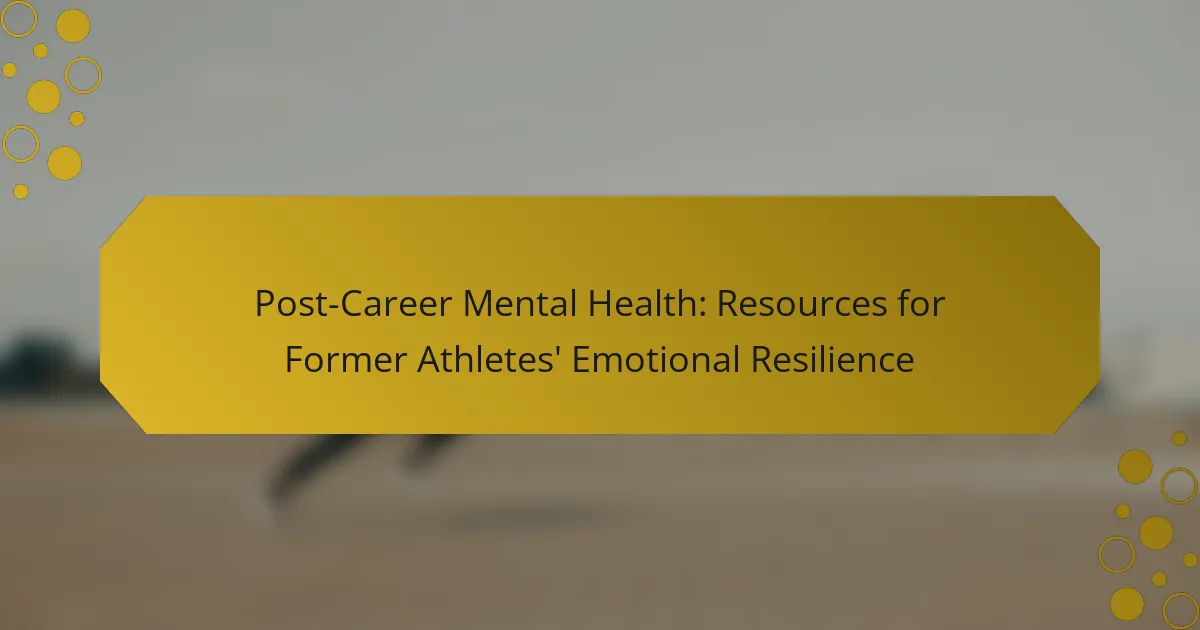Former athletes often face significant mental health challenges, including depression and identity crises, after their sports careers end. Resources like counselling, peer support groups, and community engagement can enhance emotional resilience. Understanding factors such as identity loss and social isolation is crucial for recovery. Mindfulness practices and setting new goals further empower former athletes in navigating their mental health journey.

What are the common mental health challenges faced by former athletes?
Former athletes commonly face mental health challenges such as depression, anxiety, and identity crises. Transitioning from a competitive sports career can lead to feelings of loss and uncertainty. Many struggle with adjusting to life outside of sports, impacting their emotional well-being. Research indicates that up to 35% of retired athletes experience significant mental health issues, highlighting the need for support and resources. Emotional resilience can be fostered through counselling, peer support groups, and community engagement, aiding in their adjustment and recovery.
How does identity loss impact emotional well-being?
Identity loss can significantly impact emotional well-being by leading to feelings of isolation and anxiety. Former athletes often struggle with their sense of self after retirement, which can diminish their emotional resilience. Research indicates that transitioning from a competitive environment can create challenges in identity reconstruction, resulting in depression for some individuals. Engaging in support networks and mental health resources can help mitigate these effects, fostering a more positive emotional state.
What role does social isolation play in post-career mental health?
Social isolation significantly impacts post-career mental health by increasing feelings of loneliness and depression among former athletes. Transitioning from a highly social and competitive environment can lead to a lack of support systems. Research shows that 30% of former athletes experience mental health issues due to isolation. Building connections through community resources can enhance emotional resilience, helping mitigate these negative effects. Engaging in social activities and seeking support networks are vital for improving mental well-being during this transition.
How can physical injuries contribute to psychological issues?
Physical injuries can significantly contribute to psychological issues in former athletes due to the abrupt changes in identity and lifestyle. Many athletes define themselves by their sport, and injuries can lead to feelings of loss, depression, and anxiety. Research indicates that approximately 20% of athletes experience mental health issues post-injury, highlighting the connection between physical trauma and psychological distress. Emotional resilience resources, such as counselling and support groups, can aid in coping with these challenges. Addressing both physical and mental health is essential for holistic recovery and well-being.

What resources are available for emotional resilience?
Former athletes can access various resources to enhance their emotional resilience post-career. Support groups provide community and shared experiences, while counselling services offer professional guidance tailored to their unique challenges. Online platforms host webinars and workshops focusing on mental health and coping strategies. Additionally, literature on emotional well-being can serve as a valuable resource for self-education. Engaging in physical activities and mindfulness practices also contributes to emotional strength.
What support networks exist for former athletes?
Former athletes can access various support networks focused on mental health. These networks include professional counselling services, peer support groups, and dedicated organisations like the Professional Athletes Foundation. Many former athletes benefit from programmes that offer workshops on emotional resilience and coping strategies. Additionally, online platforms provide resources for connecting with mental health professionals who specialise in sports-related issues.
Which organisations specialise in athlete mental health?
Several organisations specialise in athlete mental health, focusing on emotional resilience for former athletes. Notable ones include the Professional Athletes Foundation, which provides resources for mental health support, and the Athlete Recovery Fund, dedicated to assisting athletes in need. The National Alliance on Mental Illness offers educational resources and support for athletes facing mental health challenges. Additionally, the Mental Health Coalition collaborates with sports organisations to promote awareness and provide resources. These organisations play a vital role in addressing the unique mental health needs of athletes transitioning out of their sports careers.
How can therapy and counselling assist in recovery?
Therapy and counselling play a crucial role in helping former athletes recover emotionally after their careers. These services provide a safe space for individuals to process their experiences and feelings related to retirement.
Therapists can offer coping strategies tailored to the unique challenges athletes face, such as identity loss and transitioning to civilian life. Cognitive Behavioural Therapy (CBT) has shown effectiveness in addressing anxiety and depression, which are common among retired athletes.
Furthermore, group therapy can foster a sense of community and shared understanding, reducing feelings of isolation. This support network can enhance emotional resilience and promote healthier coping mechanisms.
Accessing these mental health resources can significantly improve overall well-being and facilitate a smoother transition into post-career life.
What role does peer support play in emotional healing?
Peer support significantly enhances emotional healing for former athletes by fostering connection and understanding. It provides a safe space for sharing experiences, reducing feelings of isolation. Engaging with peers who have faced similar challenges can lead to improved mental resilience and coping strategies. Studies show that social support is linked to lower stress levels and better emotional outcomes, making it a vital resource in post-career mental health.

What unique attributes affect former athletes’ mental health?
Former athletes’ mental health is uniquely affected by identity loss, social isolation, and coping skills. Transitioning from a competitive environment can lead to feelings of purposelessness. Many former athletes struggle with maintaining social connections, which can exacerbate anxiety and depression. Additionally, unique attributes like prior injury experiences and mental toughness can influence emotional resilience. Resources focusing on these aspects can aid in their adjustment and well-being.
How does the transition from a competitive environment influence mental health?
The transition from a competitive environment can significantly impact mental health by causing feelings of loss and identity crisis. Former athletes often struggle with their self-worth after retirement, leading to anxiety and depression. Emotional resilience resources, such as counselling and peer support groups, can help them adapt. Studies show that 60% of former athletes experience mental health challenges post-career, highlighting the need for targeted interventions.
What are the specific coping mechanisms used by former athletes?
Former athletes utilize various coping mechanisms to enhance their emotional resilience post-career. Common strategies include seeking therapy, engaging in physical activity, and building supportive social networks.
Therapy provides a structured environment for processing emotions and experiences. Physical activity helps maintain fitness and mental well-being, often serving as a familiar routine. Supportive social networks foster connection, reducing feelings of isolation.
Additionally, mindfulness practices, such as meditation and yoga, help manage stress and improve emotional regulation. These coping mechanisms significantly contribute to the overall mental health of former athletes, enabling them to navigate the challenges of life after sports.

What rare factors should be considered in post-career mental health?
Rare factors to consider in post-career mental health include identity loss, social isolation, and the transition to a new lifestyle. Identity loss occurs when athletes struggle to redefine themselves outside their sport. Social isolation can arise from the abrupt end of team dynamics and support systems. Additionally, the transition to a new lifestyle may involve challenges in establishing routines and finding new passions. Understanding these factors can enhance emotional resilience among former athletes.
How do cultural perceptions of mental health impact former athletes?
Cultural perceptions of mental health significantly affect former athletes’ emotional resilience. In many cultures, mental health issues are stigmatized, leading to reluctance in seeking help. As a result, former athletes may struggle with feelings of isolation and inadequacy after retirement. Research shows that athletes often face identity crises, exacerbated by societal expectations of strength and success. Addressing these perceptions through education and support networks can foster a healthier dialogue around mental health, encouraging former athletes to seek resources for emotional well-being.
What is the influence of fame and public scrutiny on emotional resilience?
Fame and public scrutiny can significantly impact emotional resilience, often leading to heightened stress and anxiety. Former athletes frequently face challenges in adapting to life after sports, where public attention can exacerbate feelings of isolation and pressure. This scrutiny may hinder their ability to seek help, as they might fear judgment or loss of reputation. Resources such as mental health support groups and counselling can aid in developing coping strategies, enhancing emotional resilience in the face of these pressures.

What best practices can enhance emotional resilience for former athletes?
Practicing mindfulness, engaging in community support, and setting new goals can enhance emotional resilience for former athletes. Mindfulness techniques, such as meditation, help manage stress and improve mental clarity. Community support provides a network that fosters connection and understanding. Setting new personal or professional goals encourages a sense of purpose and direction post-career. These strategies collectively empower former athletes to navigate their mental health challenges effectively.
What strategies can help in building a supportive community?
Building a supportive community for former athletes involves fostering connections, sharing resources, and promoting mental well-being. Engage in regular meetups to create a sense of belonging. Utilize online platforms to facilitate discussions and share experiences. Offer workshops focused on emotional resilience and coping strategies. Establish mentorship programmes where seasoned athletes guide newcomers through transitions. Collaborate with mental health professionals to provide access to counselling and support services.
How can former athletes maintain a healthy routine post-career?
Former athletes can maintain a healthy routine post-career by prioritising mental health and emotional resilience. Engaging in regular physical activity, establishing social connections, and seeking professional support are crucial steps.
Physical activity helps alleviate stress and anxiety, while social connections provide a support network. Professional support, such as therapy or counselling, can address emotional challenges.
Additionally, mindfulness practices like meditation and yoga can enhance emotional well-being. Setting realistic goals and pursuing new interests fosters a sense of purpose.
By embracing these strategies, former athletes can successfully navigate the transition and maintain a fulfilling, healthy lifestyle.
What common mistakes should former athletes avoid in their mental health journey?
Former athletes should avoid neglecting their emotional health, isolating themselves, and resisting professional help. Prioritise self-care, maintain connections with peers, and seek therapy or counselling. These strategies enhance emotional resilience and support a smoother transition post-career.
What expert insights can guide former athletes towards emotional well-being?
Expert insights for former athletes emphasise the importance of emotional resilience and mental health support. Engaging in therapy or counselling can help navigate identity shifts post-career. Building a support network with fellow athletes fosters connection and shared experiences. Mindfulness practices, such as meditation, promote emotional regulation and stress reduction. Additionally, pursuing new interests or hobbies can provide fulfilment and purpose, aiding in the transition to life after sports.
